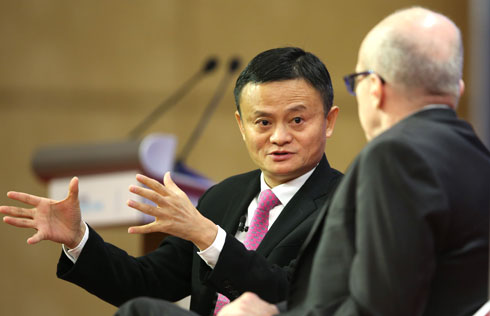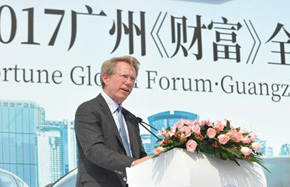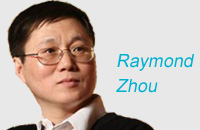Full text of Wen's speech at Britain's Royal Society
( Xinhua ) Updated: 2011-06-28 05:09:19LONDON - Chinese Premier Wen Jiabao delivered a speech entitled "The Path to China's Future" at Britain's renowned Royal Society here on Monday. The following is the full text of the speech:
Sir Paul Nurse, President of the Royal Society, Dear Fellows, Your Excellencies, Ladies and Gentlemen,
It gives me great pleasure to visit the renowned Royal Society today. I have just received the Royal Society King Charles II Medal. To me, it is not only a personal honor, but also a recognition of China's advances in science and technology. Indeed, it is a symbol of friendship and cooperation between the Chinese and British science communities, and I wish to express my heartfelt appreciation to you for awarding me the medal.
The Royal Society is the most prestigious science institution in the UK and the oldest science society in the world. It is often associated with such towering figures as Isaac Newton, Charles Darwin, Albert Einstein and Stephen Hawking, who have made epoch-making contribution to the advancement of science and technology. I wish to also salute all the Fellows present today for your outstanding achievements in promoting human progress.
This is my fourth visit to the UK as China's premier. During this visit, I have a very different impression from my last visit two years ago, in early 2009. Back then, the UK was hit by both a rare heavy snow and the global financial crisis. Coming to London from Davos, I could sense anxiety and uneasiness in the air. I remember saying during that visit, "Confidence is more important than currency and gold." But now back in mid-summer London, I can see that people have regained confidence. I greatly admire the UK's efforts and achievements.
As to my country China, it has emerged from the financial crisis stronger and is now on a steady course of growth. Let me give you an example:
You may recall that on May 12, 2008, a devastating earthquake hit southwest China. Standing on the rubbles in Wenchuan, the epicenter of the quake, I said to the Chinese and foreign journalists, "Come back in three years' time, and you will see a new Wenchuan." Over the past three years, while fighting the global financial crisis, we have mobilized the whole country to carry out reconstruction in the earthquake areas. Last month, I visited these areas for the tenth time. I saw decent housing apartments, solid school buildings and modern hospitals, and the local people were pleased with the reconstruction. I hope you will visit Wenchuan, where you will be overwhelmed by the miraculous transformation, and you will personally experience China's vitality.
People outside China see the development and changes in China since reform and opening-up in different ways. There is also an intense interest in China's future path. I wish to take this opportunity to address this subject.
In the early 1980s, Mr. Deng Xiaoping, the chief architect of China's reform and opening-up program, proposed a three-step strategy for China's modernization drive. The first step is to ensure adequate food and clothing for the people. The second step is to build a moderately prosperous society in all respects. The third step is to achieve modernization and reach the level of medium developed countries by the middle of this century. The current period from 2010 to 2020 is a crucial one for China to build a moderately prosperous society in all respects. Putting people's interests first and promoting the wellbeing of the entire Chinese people -- this is what the three-step strategy is all about. Following this path of socialist modernization, China will embrace an even brighter future.
Tomorrow's China will be an economically advanced country with its people enjoying prosperity. To pursue economic development and improve people's lives has always been the top priority of the Chinese government. We will stick to scientific development, work hard to shift the model of economic development and achieve green, low-carbon and sustainable development. We will expand domestic demand, particularly consumer demand, fully tap into the potential for consumption of urban and rural population, and make consumption the fundamental driver of economic growth. We will redouble efforts to improve public welfare, create jobs, and develop education, health and other social programs on a priority basis. We will deepen the reform of income distribution, increase the income of urban and rural households and speed up the establishment of a social security system covering both urban and rural residents. We will ensure that what is achieved in development will be shared by the Chinese people of all ethnic groups.
Science and technology hold the key to China's economic prosperity and sustainable development. The Chinese government has adopted the National Medium-and Long-Term Program for Science and Technology Development. Government R&D investment has reached nearly 100 billion U.S. dollars in the past five years, growing at an average annual rate of 22.7 percent. Under the 12th Five-Year Plan which starts this year, R&D funding as a percentage of China's GDP will rise to 2.2 percent from the current 1.75 percent. At the same time, we will accelerate the development of strategic emerging industries, with priority given to energy conservation, environmental protection, new generation of information technology, biotechnology, advanced equipment manufacturing, new energy, new materials and new energy powered automobile. These efforts will boost our development at present, and provide strong support for our development in the long run.
Globally, science and technology are also crucial for overcoming the financial crisis and ensuring stable, balanced and sustainable economic development. The world is seeing the advent of a new revolution in science and technology and a new industrial revolution. Exciting breakthroughs will be made in many fields. This new revolution in science and technology will deepen our understanding of the universe, nature and ourselves as human beings. It will open up new frontiers, unleash productive forces, create new social demand and exert a profound impact on mode of production, way of life and way of thinking. The revolution in science and technology will thus bring about a fundamental change in the development of human society in the 21st century. Science and technology know no borders. Let us together embrace the arrival of this great era.
Tomorrow's China will be a country that fully achieves democracy, the rule of law, fairness and justice. The struggles against feudal autocracy in the human history gave birth to the concepts of democracy, the rule of law, freedom, equality and human rights. These ideas have greatly emancipated the human mind, although they may be achieved in different ways and forms in different societies and countries. People's democracy is the soul of socialism. Without democracy, there is no socialism. Without freedom, there is no real democracy. Without guarantee of economic and political rights, there is no real freedom. To be frank, corruption, unfair income distribution and other ills that harm people's rights and interests still exist in China. The best way to resolve these problems is to firmly advance the political structural reform and build socialist democracy under the rule of law.
We are committed to respecting and protecting human rights. Pursuant to the law, we protect the right of all members of society to equal participation and development. We will improve mechanisms for checking and supervising government powers so as to ensure that these powers entrusted by the people are exercised in people's interests. China was long under the influence of feudalism. After the founding of New China, the country went through the turmoil of the decade-long Cultural Revolution. Since China opened itself, some new developments and problems have occurred. To promote democracy, improve the legal system and strengthen effective oversight of power remains a long and arduous task for us. We need to create conditions for people to oversee and criticize the government to make the government live up to its responsibility and prevent corruption. With a keen sense of responsibility and democracy, people will spur social progress. The more the people participate in social management and public affairs, the greater the momentum there will be to sustain social progress.
In recent years, while deepening the economic structural reform, we have actively and steadily advanced the political structural reform. Much progress has been made in making government decision-making sound and democratic and enhancing public oversight of the government. For example, we have made government affairs and budgets more transparent and introduced such practices as e-government, public hearing and expert consulting. During the past three years, before I delivered the Report on the Work of the Government each year, I had an online dialogue with the public. During this year's dialogue with the public in spring on the website of the Xinhua News Agency, I received over 400,000 posts and more than 110,000 text messages, and the webpage was visited nearly 300 million times. I opened my heart to the people, and this direct engagement enabled me to learn about what is on their minds and what they want from the government. This helps the government improve its performance.
Tomorrow's China will be a more open, inclusive, culturally advanced and harmonious country. A country or a nation will grow and progress only when it is open and inclusive. Only an open country can introduce all that is advanced and useful. And only an inclusive society can enrich and strengthen itself by drawing on the strengths of fine foreign cultures.
We should not only continue to open up in economic, scientific and technological fields, but also boldly learn from others in promoting cultural progress and social management. In its modernization drive, China has encountered various problems in he fields of energy, the environment, wealth distribution, judicial justice and government integrity. These are problems that many developed countries have run into before. We will learn from the successful experience of other countries while avoiding their mistakes. We will work with the rest of the international community to address common challenges facing the world.
We should create a better political environment and a freer academic atmosphere in which people can pursue truth, exercise reasoning and respect science, in which the mysteries of nature, the laws governing society and the true meaning of life can be fully explored. The spirit of independence and freedom in thinking is particularly important in academic studies and research. It was in an environment of academic freedom that great scientists like Isaac Newton, who had a profound impact on human history, were able to bring out their best, probe issues not questioned by predecessors and blaze a new trail. In my recent conversation with some Chinese scientists, I called for creating an environment which encourages innovation, criticism and risk-taking and tolerates failure, an environment that encourages free exploration of new things and stimulates academic debate.
We have always called for respecting the diversity of civilizations and advocated dialogue, exchanges and cooperation among them. The late Mr. Fei Xiaotong, a well-known Chinese sociologist, received his PhD at the London School of Economics and Political Science in the 1930s. Having gone through many vicissitudes in life, he concluded in his late years that "The world will be a harmonious place if people appreciate their own beauty and that of others, and work together to create beauty in the world." These thoughts best illustrate the open and inclusive mindset of China today.
Tomorrow's China will be a country committed to peaceful development and ready to shoulder its responsibilities. To pursue peaceful development is a strategic decision made by the Chinese government and people in keeping with the trend of the times and based on our own interests. Only such a pursuit will enable China to embrace economic globalization and achieve modernization. China's peaceful development is an opportunity rather than a threat to the rest of the world. China has become an engine driving global economic growth, having contributed to over 20 percent of world economic growth each year in the past five years. Since joining the WTO in 2001, China has imported close to 750 billion U.S. dollars of goods every year, creating over 14 million jobs for relevant countries and regions. China's import is expected to exceed 8 trillion U.S. dollars in the next five years, and this will provide more business opportunities for other countries.
The 21st century should be a century of cooperation rather than conflict and rivalry. China is committed to upholding world peace. We have consistently called for settling international disputes by peaceful means and opposed the use of force. China will work with the rest of the international community to undertake responsibilities, meet challenges and make the international system more equitable, just and inclusive.
Ladies and Gentlemen,
To build socialism with distinctive Chinese features is the solemn choice made by the 1.3 billion Chinese people. China owes the success of its transformation in the past 30-odd years to reform and opening-up. And China must deepen reform and opening-up to sustain its future development. Reform and opening-up will be carried out in the entire process of China's modernization endeavor. To stall or reverse course is not an option for China. We must move on with confidence. Only by doing so can China turn itself into a prosperous, democratic, culturally advanced, modern and harmonious socialist country, and can the Chinese people enjoy a happy life with dignity in a more extensive way and at a higher level. Whatever difficulties and obstacles may lie ahead, they cannot block this historical process!
Ladies and Gentlemen,
The United Kingdom is a developed country and the first to achieve industrialization. Its advanced technologies and managerial expertise in research, higher education, financial services, public health and medical services and its development of low-carbon economy can well meet China's demand. On China's part, its vast market, abundant human resources and huge development potential can help boost UK's economic growth. The Chinese government encourages large Chinese companies, research-oriented universities and research institutions to increase cooperation with their British counterparts. It also encourages more exchange of top-level talents and joint research between our two countries.
Francis Bacon said, "A wise man will make more opportunities than he finds." The Chinese and British people, with vision and creativity, can certainly create more opportunities and lift our cooperation to a new level. I have every confidence in and great expectation for the future of China-UK relations.
Thank you.
|
|
|
|
|
|
|
|
- Traditional art, modern look: Wax printing in Guizhou
- Chang'e 5 lunar probe to land on Moon and return in 2017
- China urges G7 to push Asia's economic growth forward
- Beijing finalizes preliminarily work on congestion charge
- Two-year-old undergoes surgery without opening of heart
- Microsoft pushes Windows 10 upgrade, irritates Chinese users





















 Raymond Zhou
Raymond Zhou Op Rana
Op Rana Berlin Fang
Berlin Fang Zhu Yuan
Zhu Yuan Huang Xiangyang
Huang Xiangyang Chen Weihua
Chen Weihua